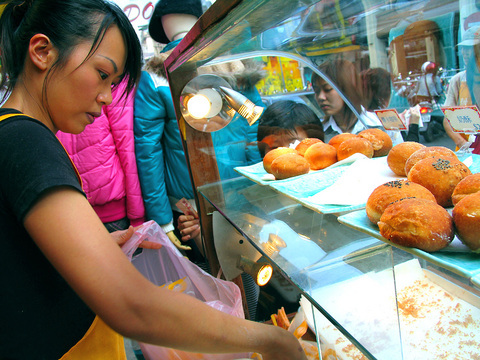Since the famed Japanese doughnut chain Mister Donut entered Taiwan late last year and created a nationwide sensation, most people -- even those who do not have a sweet tooth -- assume that it's the only place they can get delicious doughnuts.
But actually, one year before the imported business started to create a craze, local doughnut shop Tien Chiu Fang (

PHOTO: JULES QUARTLY, TAIPEI TIMES
"We have 15 branches in the greater Taipei area and a total of 70 nationwide," said Chang Chia-chien (
Tien Chiu Fang's first outlet was launched in September 2003 in Taipei's Ximending district, a magnet for the young who love trying novel things.
Everyday at 1:30pm, when its door open, a queue starts growing in front of the glass cabinet, where the steaming hot fried donuts are soon snatched away. Business always peaks after 4pm when people take some time off for a tea break, Chang said.
In contrast to the Japanese-style sweets sold at Mister Donut, Chang said his recipe is based on the traditional confection, with a crisp outer layer and chewy texture inside that richens the taste.
"The crispy part makes it even more tasty. The only drawback is that it's fried and therefore a bit greasy," said a woman surnamed Liao
Chang is proud of his golden crispy confection, which are sprinkled with white sugar.
"They require ten ingredients and special `fen hsin' flour
A former salesman in traditional markets who used to hawk mushrooms and clothes, Chang said he's had rich experience on how to do business as customers are always attracted to "different but good quality" products. Applied to his doughnut world, that rule means providing different but delicious flavors.
After working with friends in southern Taiwan selling traditional doughnuts, he decided to explore the market in the north.
Following months of research and development, he and his wife Huang Mei-chun (
With initial capital of nearly NT$400,000 (US$13,000) in the store, the Chang family broke even within two months. Now the shop sells an average of 1,000 doughnuts a day while its other outlets sell some 700 a day.
His sophisticated business sense is also reflected in the shop's logo, which was designed by the well-known cartoonist Chang Jung-kuei (
"Many customers said that wherever they go, they look for our sign to get donuts," he added.
Indeed, the small shop has quickly proliferated to cover 70 locations, most of which are run by couples. Now Chang is in charge of the business in the north, while his brother-in-law takes care of branches in central and southern Taiwan.
While Chang was being interviewed by the Taipei Times, a man in his 30s waited nearby to ask for information about franchising and tips on fulfilling his family's dream.
Although some think that the current doughnut craze could go the same was as the egg tart fad -- which had a swift demise -- Chang has confidence that his doughnut business is here to stay.
"Flour is one of Taiwanese people's staple foods and I constantly develop new flavors to lure people's diverse palates."
In addition to expanding through more franchises, his next step will be to introduce non-sweet -- and perhaps even salty -- fillings in fried pastries.
Chang says that Mister Donut's overwhelming popularity has actually helped his business, since more people are talking about doughnuts and more press reports target the Japanese chain's competition.
"This year, the doughnut business will be even stronger," he added with a smile.

To many, Tatu City on the outskirts of Nairobi looks like a success. The first city entirely built by a private company to be operational in east Africa, with about 25,000 people living and working there, it accounts for about two-thirds of all foreign investment in Kenya. Its low-tax status has attracted more than 100 businesses including Heineken, coffee brand Dormans, and the biggest call-center and cold-chain transport firms in the region. However, to some local politicians, Tatu City has looked more like a target for extortion. A parade of governors have demanded land worth millions of dollars in exchange

Hong Kong authorities ramped up sales of the local dollar as the greenback’s slide threatened the foreign-exchange peg. The Hong Kong Monetary Authority (HKMA) sold a record HK$60.5 billion (US$7.8 billion) of the city’s currency, according to an alert sent on its Bloomberg page yesterday in Asia, after it tested the upper end of its trading band. That added to the HK$56.1 billion of sales versus the greenback since Friday. The rapid intervention signals efforts from the city’s authorities to limit the local currency’s moves within its HK$7.75 to HK$7.85 per US dollar trading band. Heavy sales of the local dollar by

Taiwan Semiconductor Manufacturing Co’s (TSMC, 台積電) revenue jumped 48 percent last month, underscoring how electronics firms scrambled to acquire essential components before global tariffs took effect. The main chipmaker for Apple Inc and Nvidia Corp reported monthly sales of NT$349.6 billion (US$11.6 billion). That compares with the average analysts’ estimate for a 38 percent rise in second-quarter revenue. US President Donald Trump’s trade war is prompting economists to retool GDP forecasts worldwide, casting doubt over the outlook for everything from iPhone demand to computing and datacenter construction. However, TSMC — a barometer for global tech spending given its central role in the

An Indonesian animated movie is smashing regional box office records and could be set for wider success as it prepares to open beyond the Southeast Asian archipelago’s silver screens. Jumbo — a film based on the adventures of main character, Don, a large orphaned Indonesian boy facing bullying at school — last month became the highest-grossing Southeast Asian animated film, raking in more than US$8 million. Released at the end of March to coincide with the Eid holidays after the Islamic fasting month of Ramadan, the movie has hit 8 million ticket sales, the third-highest in Indonesian cinema history, Film